
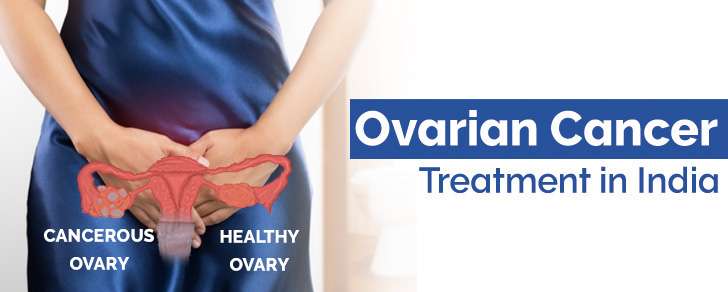
Ovarian cancer is a deadly condition that affects a number of women from all around the globe. The problem arises due to the rapid multiplication of abnormally growing cells in the ovaries, which leads to the formation of a tumour. Known to be a silent killer, this malignancy goes unnoticed in its early stages, and the few signs or symptoms that crop up are so subtle that their significance often does not get recognised.
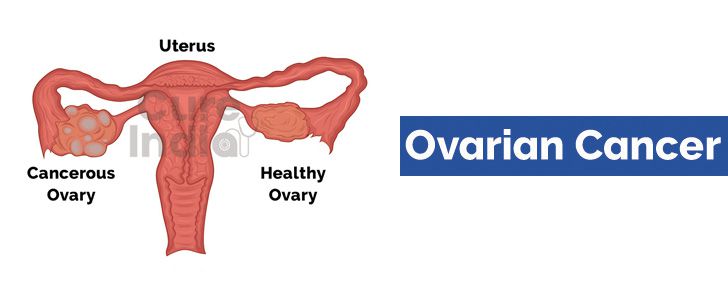
With the evolution of medical science, viable ovarian cancer treatment options, such as ovarian cancer surgery and ovarian cancer chemotherapy, have proven to offer good prospects for the ultimate recovery of patients. Still, thousands of African women suffer from this condition every year, with limited access to specialised treatments. As a response to this, they travel to countries like India for good-quality cancer treatment. India is currently gaining ground as one of the main destinations for the treatment of ovarian cancer, providing highly equipped facilities, trained doctors, and yet affordable healthcare services. This page will be a patient’s guide to availing cost-effective ovarian cancer treatment in India.
The initial symptoms of ovarian cancer might appear vague and you might mistake it with other common disorders. That is where the trouble begins. However, the most visible early signs of cancer include rashes, back pain, irregular menstrual cycle, and painful intercourse. Nevertheless, with the development of the disease, the symptoms become more noticeable. The signs that generally appear with the advancement of the disease include:

However, as all these symptoms appear to be normal, most of you tend to suppress them. But if these symptoms last longer, make sure to consult a specialist immediately. With the increase of the tumor's size, the symptoms start becoming intense.
Although it is not entirely clear what causes ovarian cancer, a few factors have been identified that can increase a woman's risk of developing the disease. They are:
Ovarian cancer is more common in women aged over fifty, with risks increasing respectively after menopause. However, the disease can still be found in younger women, especially those with a family history.
When a family member has ovarian, breast cancer, or colorectal cancer, the risk of this condition increases, so it is good that women with a family member having these cancers screen for ovarian cancer at regular intervals so that any signs of early detection are noticed.
The presence of inherited mutations, such as BRCA1 and BRCA2, raises the risk of developing ovarian cancer. Women with these mutations are also at an increased risk of developing breast cancer. Genetic testing can be advantageous in testing for these mutations and in guiding preventive measures.
The ovarian cancer stages are determined by investigating how far cancer has spread. Cancer in ovaries are divided into four main stages and each stage has its separate sub-stage. Understanding these stages of ovarian cancer is indispensable for selecting the most effective treatment method:
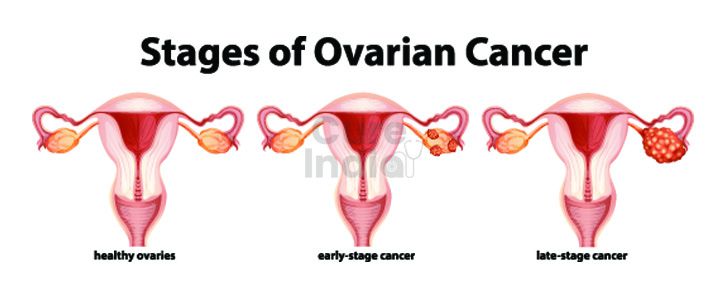
Here, cancer is limited to one or both ovaries or fallopian tubes. At this stage, ovarian cancer surgery can often remove the tumour effectively. The first stage of cancer involves three different sub-stages:
During the next phase, the cancer cells are spread in the distant part of ovaries affecting the pelvic areas.Oftentimes, Ovarian cancer surgery followed by chemotherapy is the primary treatment plan at this stage. The second stage comprises of two sub-stages:
In stage 3, cancer has spread beyond the pelvis to the abdominal lining or lymph nodes. This is a more severe stage of ovarian cancer and requires aggressive treatment, such as major surgery and chemotherapy for ovarian cancer. It subsequently has three sub-stages.
Stage 4 of ovarian cancer is the worst phase that comes with two sub-stages 4A and 4B. In this advanced stage, the tumor tends to metastasize and spread at the parts of the liver and lungs. The treatment for this advanced stage is a tad difficult but has improved through recent innovations in cancer medicine in India.
The state-of-the-art diagnostic facilities in India provide accurate detection and staging of ovarian cancer. Modern imaging techniques, blood tests, and biopsy services, among others, assure precise diagnosis. This, in turn, is essential to plan effective cancer treatment.
In its array of healthcare services, hospitals across India have taken the initiative to provide a package plan including initial consultations, treatments, care in follow-ups, and support coverage. These make the cancer treatment process seamless for international patients.
Upon getting the above-mentioned symptoms, your first task will be to consult a physician to undergo a primary health checkup. After doing the tests and examinations, if you are diagnosed with ovarian cancer, opt to go contact the best oncologist to receive the best ovarian cancer treatment. Regardless to mention, India is considered to have one of the best treatment programs globally for treating cancer. The oncologists from India are highly skilled and can recommend the ideal treatments. Health centers like SCI, Artemis, Medanta, Fortis, etc are renowned for treating cancer. Because of such amazing arrangements for treating the disease at an affordable expense, cancer affected Africans have considered visiting India every now and then.

One of the primary approaches to treating ovarian cancer involves surgery. The surgeon generally removes one or both of the ovaries and the uterus, together with surrounding tissues, depending on the stage. Minimally invasive surgeries for the same using laparoscopic or robotic approaches ensure the shortest recovery period and a lesser complication rate.
Chemotherapy for ovarian cancer uses powerful drugs to kill cancer cells. It is given after surgery to destroy any remaining cancer cells but is also used before surgery (neoadjuvant chemotherapy) or as the primary treatment in advanced stages. our leading hospitals in India offer personalised chemotherapy plans tailored to each patient’s condition and cancer type.
Using drugs, targeted therapy kills cancer cells without causing any harm to normal cells. This treatment is particularly effective in patients with specific genetic mutations.
Using advanced or modern techniques, immunotherapy helps enhance the natural ability of the body's immune system to fight cancer and is available with high success rates at our top hospitals.
Finding the right specialist is important in treating ovarian cancer successfully. India is home to some of the world’s most experienced oncologists, who deliver quality cancer treatments through advanced medical technology. We offer a wide network of gynecologic oncologists and cancer centres who are known for their excellence and high treatment success rates. Here are some of our best doctors for ovarian cancer treatment in India:
Dr. Sabhyata Gupta is an experienced gynae-oncologist and robotic-surgery expert in India. With over 24 years of experience to her credit, she is currently the chairperson of gynaecology & gynaecological oncology at Medanta - The Medicity. She has received extensive international training and is the first gynecologist in India to perform robotic surgery for both benign and malignant gynecological conditions, including ovarian cancer.
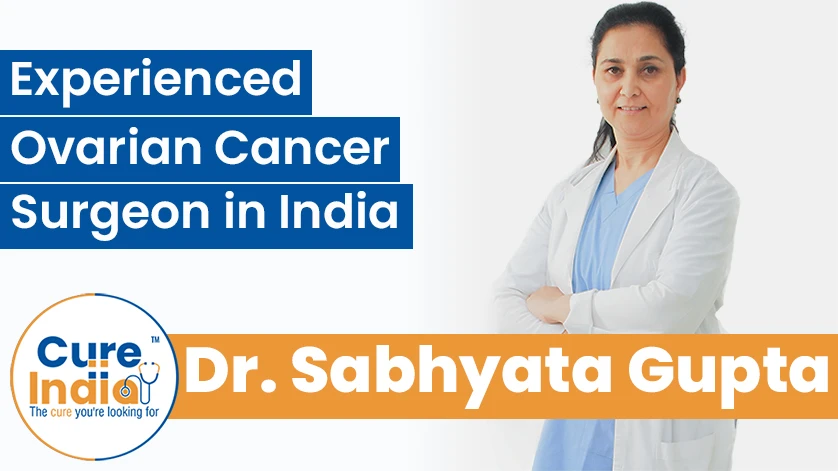
Dr. Sarika Gupta is an ovarian cancer treatment specialist in India with more than 15 years of experience, currently serving as a gynacological oncologist at Indraprastha Apollo Hospital. She is extensively trained in gynecologic oncology and robotic surgery internationally and brings advanced surgical techniques such as laparoscopic and robotic procedures for treating ovarian and other gynecological cancers.
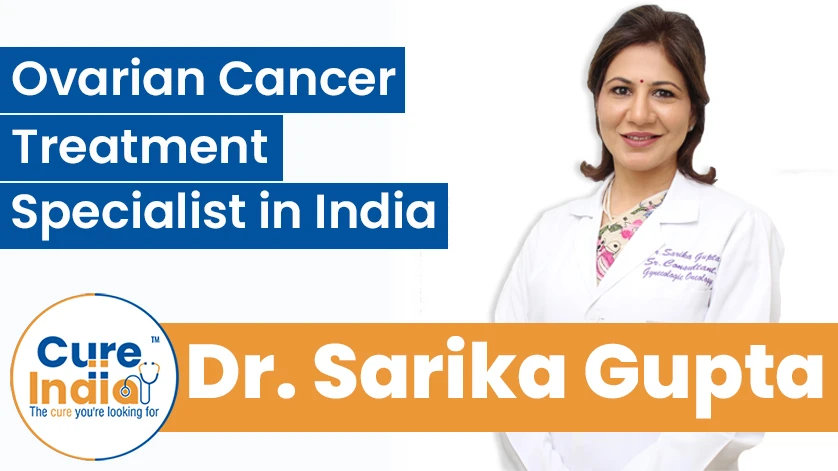
Dr. Pramod Kumar Julka is a top ovarian cancer doctor in India with over 46 years of experience in oncology and radiotherapy. He has comprehensive expertise in the field of gynecologic oncology, including ovarian cancer, cervical cancer treatment and more. He has been honoured with the Padma Shri for his track record in providing comprehensive gynecological treatments.
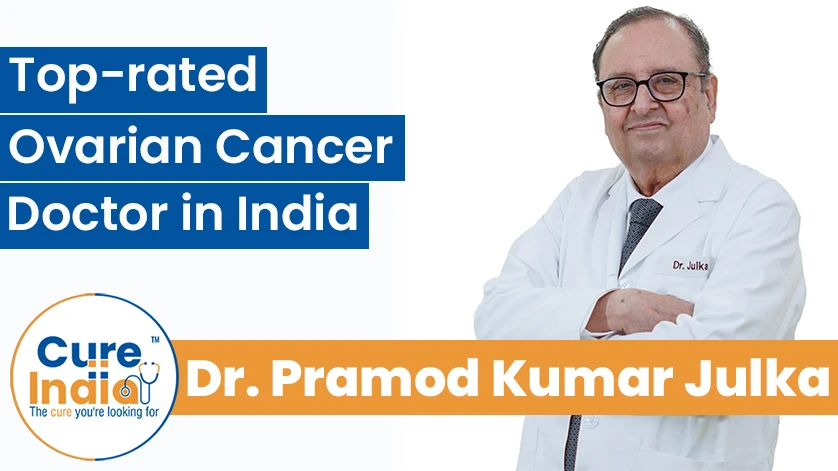
Dr. Vineet Govinda Gupta is a leading medical oncologist in India with extensive experience and training in medical oncology. With an experience of more than 11 years, he offers specialised treatments for cancer, such as ovarian cancer, with techniques including chemotherapy, targeted therapy, immunotherapy, and long-term management.

The cost of ovarian cancer treatment in India is very affordable compared to many Western countries, yet it still offers high-quality medical care and advanced treatment options. The total cost of treating this cancer varies depending on factors such as the stage of the disease, the complexity of surgery, the type of chemotherapy required, and the choice of hospital.
On average, the ovarian cancer treatment cost in India is around $8,000. Standard debulking surgery and chemotherapy fall within the lower to mid range, while advanced treatments such as targeted therapy, HIPEC, or prolonged hospitalisation can increase the total expense.
At CureIndia, we also offer personalised treatment packages, transparent pricing, and support for insurance or medical tourism services for better affordability without compromising on the treatment quality.
| Treatment Name | Cost in India | Stay in India |
|---|---|---|
| Ovarian Cancer Treatment in India | $8,500 | 10-15 Days |
India has an almost historical success rate in treating ovarian cancer. It is on par with the best hospitals around the globe. This success is achieved by using the most advanced technological tools and skilled healthcare personnel. The five-year survival rate depends on how early the cancer is detected. Early detection and timely treatment can lead to survival rates approaching or surpassing 90 percent. Survival rates in advanced stages are also significantly improved. This is achieved through a blend of treatments offered by oncologists, such as ovarian cancer surgery and chemotherapy.

India offers multidisciplinary and specialised treatment approaches combined with personalised care. Patients also benefit from access to the latest medical advances, ensuring high-quality care at hospitals. The country is also known for its cost-effectiveness, making it an attractive option for foreign patients. These factors position India as a highly preferred destination for ovarian cancer treatment.
Ovarian cancer is a serious but treatable condition, especially when diagnosed early and managed with timely care. India offers the best quality ovarian cancer treatment that utilises advanced medical technology, experienced specialists, and affordable treatment services.
Many Indian hospitals are equipped with state-of-the-art diagnostic tools, modern surgical techniques, and specialised cancer care units. Patients benefit from the expertise of experienced gyne-oncologists, who provide personalised treatment plans based on international standards.
Early identification of the signs and timely intervention helps stop the disease progression and improve long-term outcomes. With a focus on early detection, comprehensive gynecological treatments, and patient wellbeing, India has become one of the most preferred countries for ovarian cancer treatment.
